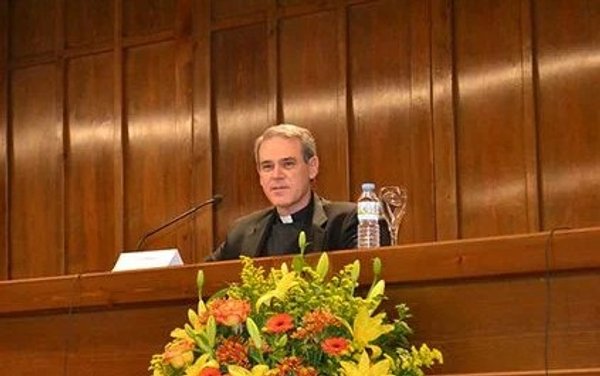“Christianity is not a moral doctrine, or a higher wisdom: it is fundamentally a Person, Jesus Christ.” This was how Luis Buch, Professor of Moral Theology at the University of Navarre, began his presentation during the Conference on Pastoral Questions.
In his presentation, entitled “For me to live is Christ” (Phil 1:21), Lucas Buch reflected on what the encounter with Christ entails. He spoke about the way Jesus looked at people, and pointed to specific encounters with Him in the Gospel: the woman taken in adultery, the rich merchant Zacchaeus, and the conversion of Saint Paul. All three encountered “the unconditional love of God. Christian life is born and nourished through meeting a Person who looks intently at us and affirms us, challenging us to leave a worldly life and begin a new life guided by a transcendent goal.”
The risk today for any Christian who takes up this path is the possibility of falling into “the worldliness of physical well-being, a spiritual worldliness that reduces the Church and our efforts in her service to a merely temporal perspective. This involves the temptation of thinking that our worth before God depends upon what we do through our own efforts – what Pope Francis has called ‘the self-absorbed neo-pelagianism of those who trust only in their own powers,’ as we read in Evangelii Gaudium.”

Sharing in Christ’s sentiments
Julio Dieguez, professor of Moral Theology at the Pontifical University of the Holy Cross in Rome, and Rector of the Seminary of the Prelature of Opus Dei, spoke about striving to attain the “same sentiments as Christ Jesus” (cf. Phil. 2:5). “The configuration with Christ that all Christians are called to, and priests in a special way, means ultimately sharing in Christ’s sentiments.” And he added that “if we want to act as Jesus did, we need to make his way of being our own.”
“Acting morally is not a decision of the will that represses or deadens the affections; rather it is the integration of the will, affections and reason, that is, the virtues. Virtuous behavior reveals how I actually feel. Acting freely is not submitting myself freely to an external norm, but rather acting in accord with a norm that I have freely taken on as my own.” In the moral life it is important to ask oneself: “what kind of life do I really want to live and what is it I most deeply desire, because every free decision is an investment towards becoming the person I want to be.”
Primacy of Christ
The two presenters who spoke during the first day of the conference were Armand Puig, Rector of the Ateneo Universitario Sant Pacià, and Juan Costa, Delegate for Social and Charitable Pastoral Work in the Archdiocese of Barcelona. In their presentations, they emphasized the centrality of Christ in the life of priests and all Christians.
Armando Puig, a specialist in Sacred Scripture, spoke about the need to present the figure of Christ to people today in a way that is attractive. “Jesus’ words are always accompanied by deeds. A disciple is someone who learns from the Master a way of being and acting: living as Jesus did.”

Referring to the current health crisis, Puig said that “the pandemic is an evil, and has done us harm, because it has caused us to fear and made us withdraw into ourselves, with spiritual consequences. It has led us to question our identity, and calls into question our identity as apostles.”
Christ is the ultimate moral criterion
Juan Costas, in turn, spoke about how Christ will always be the first and ultimate reference point, the model for all Christian action.
“Christ’s life,” he said, “is the specific and universal norm for our own actions.” “A purely human ethics is not fully human. If ethics is to be truly human it needs to be Christian, since Christ is the ultimate moral criterion. He is not just one element to keep in mind in examining our moral conduct. Rather each of the moral norms expresses a way of following Christ.”
Ignasi Font, Vicar of the Prelature of Opus Dei in Cataluña, gave the opening address. He read some words from Pope Francis addressed to priests: “You must never forget the constitutive bonds of your own identity: first of all with Jesus.” Therefore, Font continued, “if we want to call people to follow Christ, we need to reflect his life in our own life and make his figure attractive.” He also referred to Saint Josemaria, founder of Opus Dei, whom he spoke with on several occasions. He recalled that “no matter what he was speaking about, he never failed to make reference, at least implicitly, to the life of Jesus.”
Some thirty priests took part in the Conference, besides those who did so virtually. In total about 100 were signed up. It was organized by the Rossello Center for Priests, under the direction of the Priestly Society of the Holy Cross, an association intrinsically united to Opus Dei which offers diocesan priests spiritual help and encouragement in their priestly work, in union with their bishop and in communion with their brothers in the priesthood.
